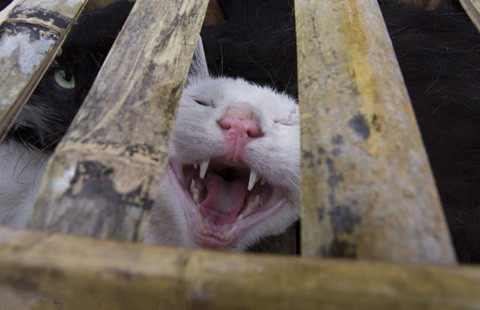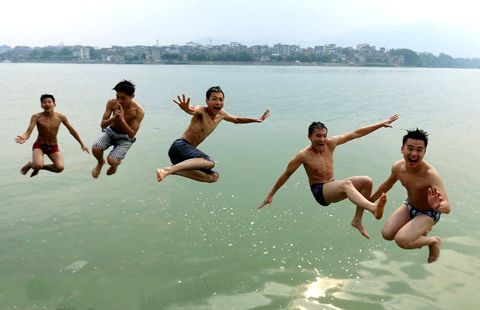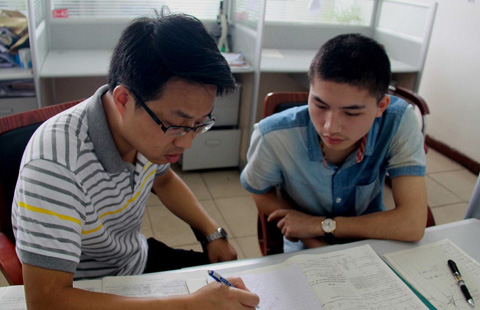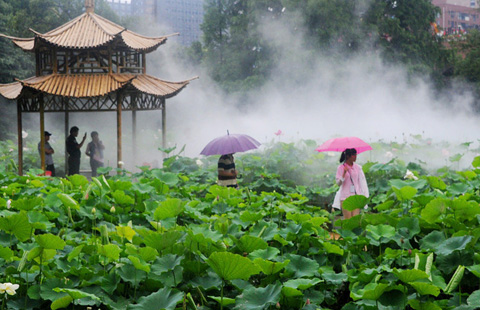'Naked officials' being uncovered
Updated: 2014-07-02 08:14
By Zhang Lei (China Daily)
|
||||||||
|
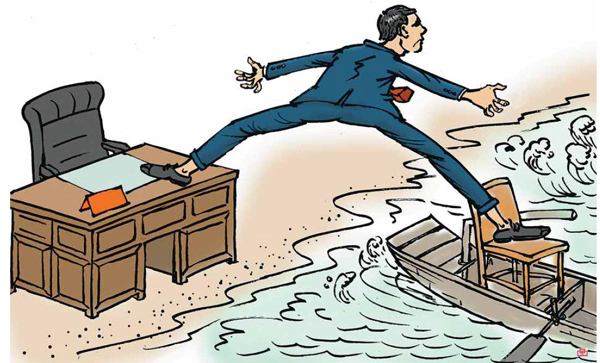 Zhao Guopin/For China Daily |
Campaign against corruption brings into focus people in positions of responsibility whose families are living overseas. But one province is leading the way to ensure that the home alone concept is being tackled, reports Zhang Lei in Beijing.
The campaign against corruption is throwing new light on officials who send their wives and children abroad, where they can possibly set up channels for the transfer of illicit income and establish a base in case they are forced to flee China.
These "naked officials", a moniker that has gained currency among the general public, not least because of its mocking tone, are not necessarily corrupt, but the potential is there and at the very least it sends the wrong signal. After all, if an official's family is overseas, then questions can be asked about their work commitment, analysts said.
One province is tackling the issue and has already repositioned, demoted or retired officials who have not brought their families back or provided a satisfactory explanation for sending them overseas.
Nearly 900 government officials in Guangdong province, mostly occupying midlevel positions, have been repositioned after investigators discovered that their families had obtained either permanent residency or citizenship abroad while the officials continued to work in China.
The move is heralded by many as a confirmation of the government's resolve to tackle corruption, and it is the first time a provincial government has taken such action.
According to People's Daily, Guangdong has completed the repositioning of "naked officials", which include nine prefecture-level and 134 county-level officials. In May, Fang Xuan, deputy Party secretary of Guangzhou, retired five months earlier than scheduled, making him the highest-ranked official in the province to be targeted.
"There is no doubt that this is a breakthrough," said Ding Yuanzhu, deputy director at the Consultation Department of the Chinese Academy of Governance.
"For the first time the public obtained data and details of the 'naked officials' from official sources. The media coverage has also been comprehensive.
"These officials pose a very serious problem. Their behavior shows that they do not have confidence in the economic future of the country. When these people assume important positions in our government but don't have confidence in our country, this could lead to negative consequences for ordinary people."
The coastal province has adopted an under-the-radar strategy, quietly removing the officials from key positions. By the end of May, the Guangdong government had uncovered more than 1,000 "naked officials". Of these, more than 200 chose to bring their families home. In Jiangmen alone, 128 officials have been transferred to other positions.
The strategy - either you bring your family back or accept a transfer to a lesser position or accept early retirement - has evolved over the last two years.
Prior to the crackdown, the officials were normally found out through whistleblowers and while this is still an option new regulations have made it easier to track them.
In July 2010 leading cadres had to declare their family status, where they were living, as well as any real estate assets and other economic investments.
In 2012, the Guangdong Provincial Party Committee proposed that "naked officials" should not hold important leadership positions.
But the reality is that some officials became "naked" after promotion and self-declarations of assets, requiring stringent background checks, may not be the most efficient, according to Xu Yaotong, professor at the Chinese Academy of Governance.
Huang Xianyao, discipline inspection commission secretary of Guangdong province, said that there are some officials who do not fully declare their assets. On top of this, some may have created a paper trail, making it more difficult to uncover their financial worth.
According to the newly revised regulations on election and appointment of leading cadres promulgated by the central government in January, "naked officials" should not be listed as candidates for any promotion opportunities, the first time the Party's central authorities had placed restrictions on the "naked officials".
Li Chengyan, director of the Center for Anti-corruption Studies of Peking University said, although "naked officials" are not necessarily corrupt, it makes it easier for corrupt behavior to take place.
According to the People's Supreme Procuratorate 2013 work report, 762 suspected officials who had been on the run were arrested last year, and the government retrieved approximately 10 billion yuan ($1.6 billion). With China's accession to the UN Anti-Corruption Convention, increased efforts have been devoted to fighting corruption.
Guangdong has clearly taken a firm stand, and this was triggered by an inspection team dispatched by the country's top anti-graft agency in February. The team criticized what it said was an "outstanding" problem of "naked officials" in Guangdong, highlighting a situation that was quickly tackled.
Municipal Discipline Inspection Commission spokesman Mei Heqing said last week in Guangzhou that from January to May this year, 20 "naked officials" have been identified on the Guangzhou city management team, an increase of 122 percent from the previous year. Guangzhou, adjacent to Hong Kong and Macao, will also improve measures to strengthen passport management.
Dongguan has also targeted the officials, with 127 (19 prefecture level cadres and 108 civil servants) being repositioned. Six were town Party secretaries or mayors.
The city government conducted interviews with these officials. Deputy Secretary Si Qi of the Dongguan Municipal Organization Department said that some cadres initially considered the crackdown unreasonable, but when told of the reasoning behind it, they saw its merits.
Guangdong is also taking measures to boost the self-declaration process and checking.
Ding, deputy director at the Consultation Department of the Chinese Academy of Governance, suggested that the Guangdong authorities should include more detailed disclosure of information on the "naked officials", including their new positions. Since they hold public office, privacy concerns are secondary to the public's right to know, he said.
"I think we should learn from Russia," he added.
Russian President Vladimir Putin questioned the overseas assets of officials and said if these officials do not believe in the economy of their country, what is the use of them staying in Russia? When they do put money back to their own country, they will be committed to building and consolidating their financial and the Russian economic system, he said.
On April 2, 2013, Putin signed a presidential decree that civil servants must, within three months, close all overseas accounts and sell overseas assets. Failure to do so would lead to their dismissal.
Contact the author at zhanglei@chinadaily.com.cn
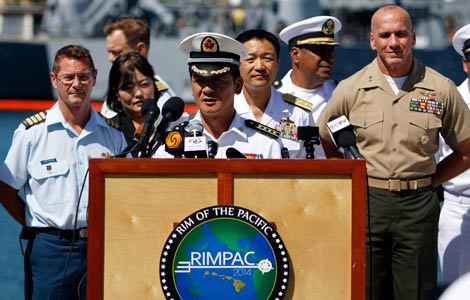
 China navy is RIMPAC 'highlight'
China navy is RIMPAC 'highlight'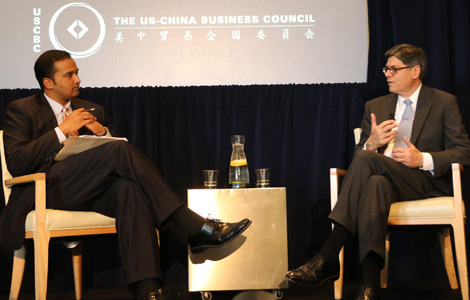
 US hopes high for S&ED
US hopes high for S&ED
 Move to domestic software pressures foreign companies
Move to domestic software pressures foreign companies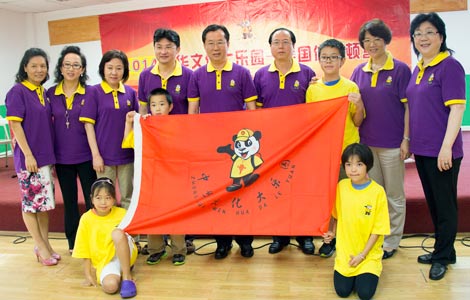
 Culture camp delivers authentic China
Culture camp delivers authentic China
 Ancient Chinese folktale returns to New York City
Ancient Chinese folktale returns to New York City
 US admiral tours Chinese warship
US admiral tours Chinese warship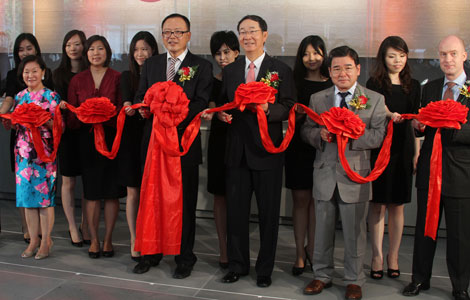
 Bank of China opens branch in Queens
Bank of China opens branch in Queens
 Chinese navy in Hawaii for joint exercise
Chinese navy in Hawaii for joint exercise
Most Viewed
Editor's Picks

|

|

|

|

|

|
Today's Top News
China's presence in RIMPAC 'significant': US commander
Top-level general expelled for graft
China says no evidence of pet link
US sends 300 more troops to Iraq
Palace Museum feeling the squeeze of visitors
Slower CPC membership growth reflects stricter recruitment
US business-jet company awaits green light to operate in China
Move to domestic software pressures foreign companies
US Weekly

|

|
